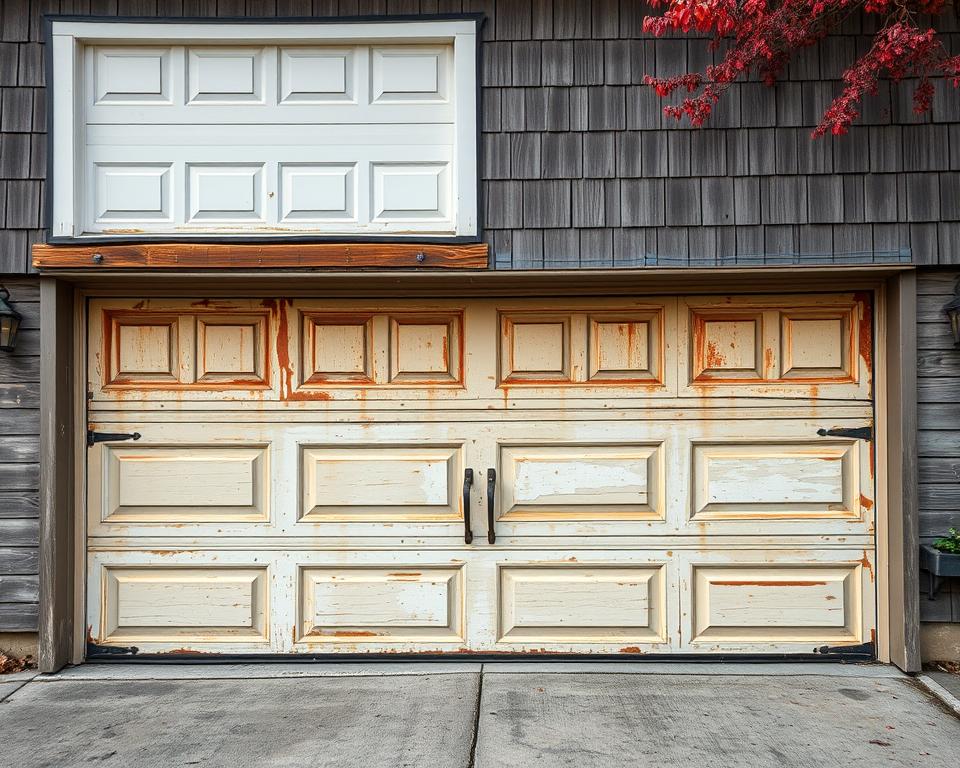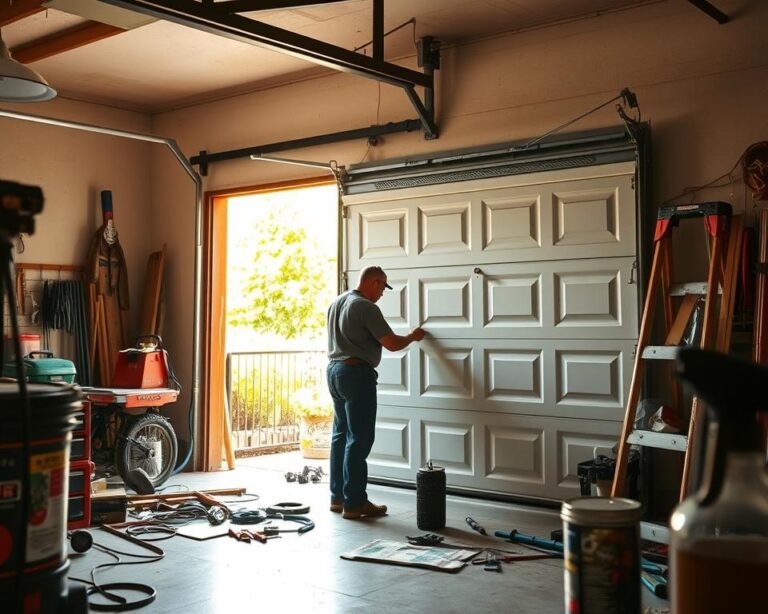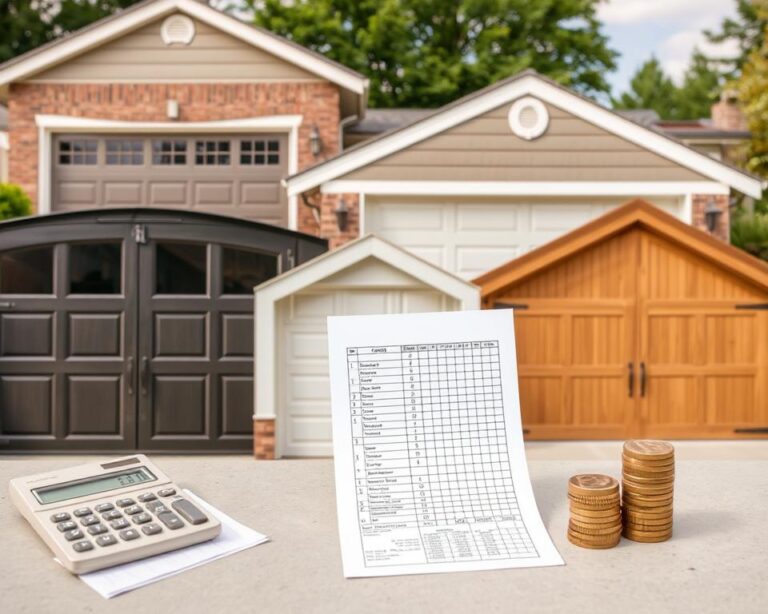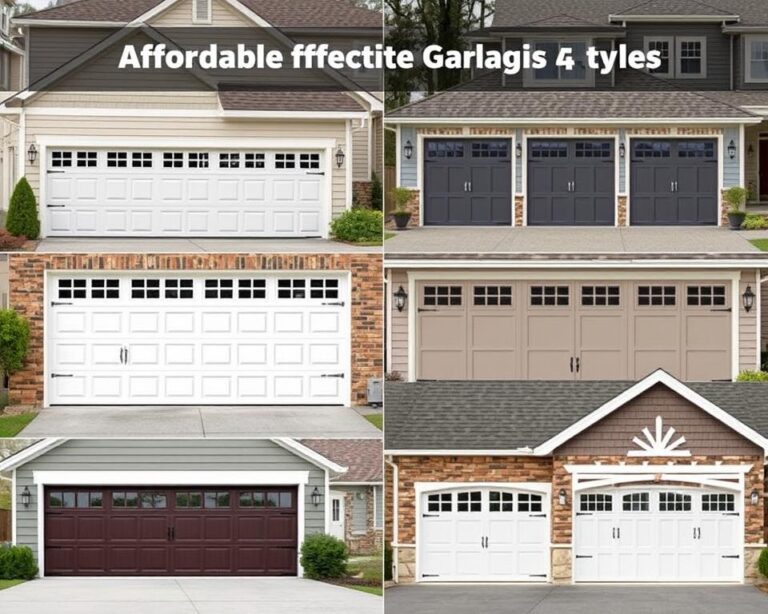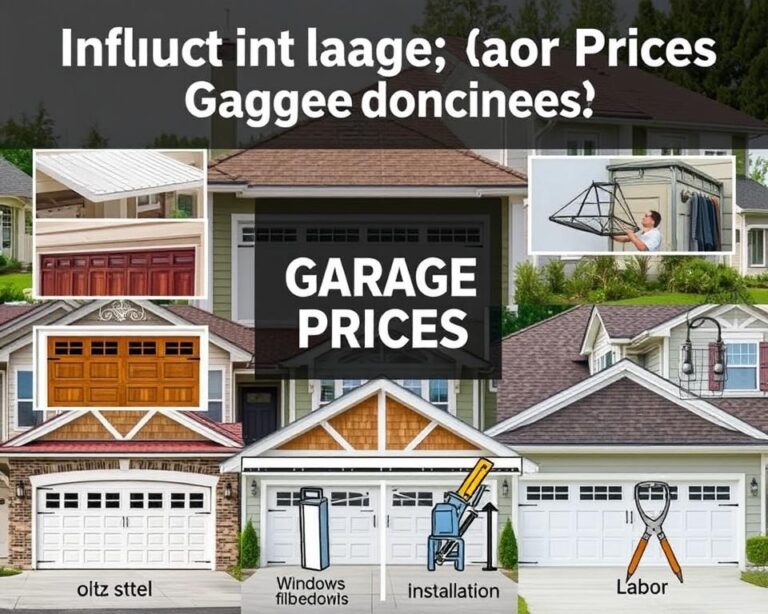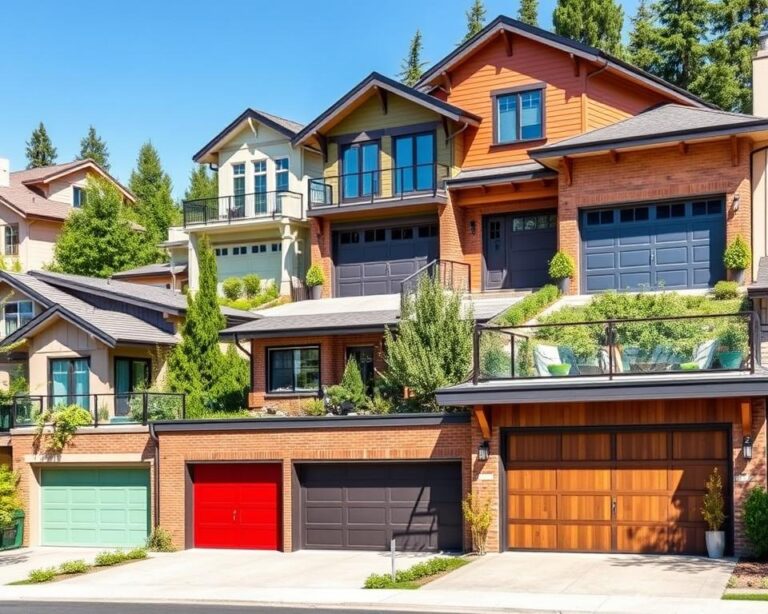How Often Should a Garage Door Be Replaced?
We often wonder about the garage door replacement frequency and the best time to replace a garage door. The average garage door in America opens and closes about 1,500 times a year. This can cause wear and tear, affecting how often we need to replace it. Knowing when to replace a garage door is key for our home’s safety and value.
It’s important to find the right time to replace a garage door. A garage door can last about 30 years with regular maintenance. But, several factors can change this. We’ll look at these factors and the signs that show it’s time for a new garage door. This will help us make smart choices about when to replace our garage door.
When thinking about replacing a garage door, we need to consider how often it should be done. By understanding these points, we can keep our garage door working well and safely. This affects our home’s value and helps us decide the best time to replace a garage door.
Understanding the Average Lifespan of Your Garage Door
Wondering when to replace a garage door? It depends on several things. Garage doors usually last between 15 to 30 years. This varies based on how much you use it, the environment, how well you maintain it, and the type of door.
Regular upkeep can help your garage door last longer. But, there’s no exact percentage for how much longer.
The number of times you open and close your garage door affects its lifespan. Garage doors are made from wood, vinyl, aluminum, or steel. Each needs different care.
Signs of wear include louder operation and longer times to open and close. It’s important to check parts like rollers and weather seals regularly. This can prevent expensive repairs.
- Usage: Opening and closing a garage door three times daily results in approximately 1,000 cycles per year.
- Environment: Excessive heat, storms, and winds can lead to reduced lifespan of garage doors.
- Maintenance: Regular maintenance can extend garage door lifespan.
- Type of door: Different materials affect longevity, with steel doors lasting up to 30 years.
Knowing when to replace your garage door is key. Look for signs like age over 20 years, sagging, loud noises, and frequent repairs. By keeping these in mind, we can make smart choices about our garage doors. This ensures they work well for many years.
Key Signs It’s Time for a Garage Door Replacement
Garage doors usually last between 15 to 30 years. It’s important to know when it’s time for a new one. Some signs can tell you it’s time for a change.
Look out for decreased function, increased noises, and an outdated style and appearance. A good garage door works well with the opener. If it doesn’t, it might need to be replaced. Also, doors that close too fast can be dangerous.
Here are some key signs to look out for:
- Age: Garage doors that are 20 or more years old and used daily are candidates for replacement.
- Noise: Excessive noise from a garage door can indicate significant issues that require attention, potentially leading to a replacement.
- Aesthetics: Not updating garage doors for a decade or two can negatively impact the overall look and curb appeal of a property.
By recognizing these signs and considering the garage door replacement frequency, we can ensure our garage doors are functioning safely and efficiently, while also maintaining the overall value and appearance of our properties.
Factors Affecting Garage Door Replacement Frequency
Several factors influence when to replace a garage door. The door’s lifespan depends on maintenance frequency. Extreme temperatures and weather can shorten a garage door’s life. The door’s initial quality and maintenance history also matter.
Regular maintenance is key to a garage door’s longevity. This includes lubrication, repairs, and inspections. The maintenance schedule varies based on usage and environment. Doors used often need more upkeep than those used less.
Environmental Conditions
Severe weather can damage a garage door. Heavy rain, snow, or sunlight can cause wear. Proper sealing and insulation can help protect the door.
Quality of Initial Installation
A good initial installation can make a garage door last longer. It ensures the door is aligned, balanced, and secure. A well-installed door needs less maintenance and withstands weather better.
By understanding these factors and maintaining a garage door regularly, homeowners can make their door last longer. This reduces the need for frequent repairs or replacements.
The Role of Regular Maintenance in Extended Door Life
Regular maintenance is key to making a garage door last longer. Tasks like lubricating parts, checking springs, and cleaning tracks prevent small problems from getting big. Doing these tasks often keeps the door working well and safely.
Ignoring maintenance can cause safety issues and might mean you’ll need to replace the door often. This can be costly and risky.
Some important maintenance tasks include:
- Lubrication of moving parts to reduce wear and tear
- Inspection of springs to prevent breakage
- Track cleaning to prevent corrosion and rust
- Weather stripping replacement to prevent water intrusion
- Tightening of fasteners to ensure secure operation
Annual maintenance helps protect and extend the life of your garage door. It keeps it running smoothly. This can save you a lot of money by avoiding big repairs and replacements.
It’s best to service a garage door once a year if you use it daily. If it’s mostly for storage, every two years is fine. Regular checks can prevent big problems and extend the door’s life.
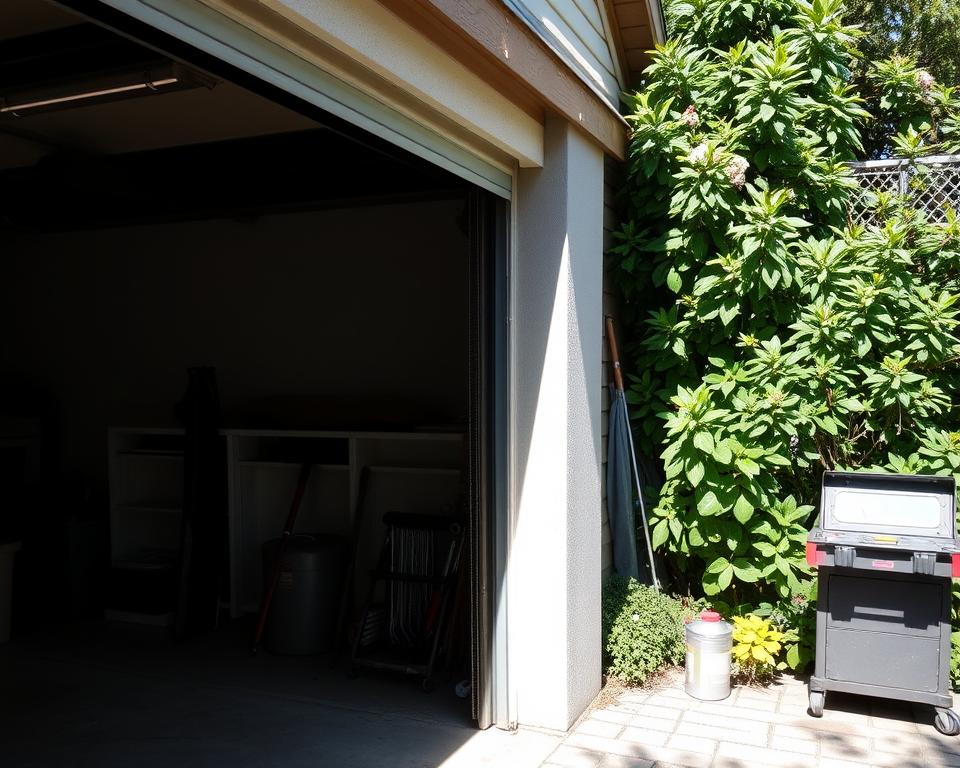
Regular maintenance also stops spring problems. If springs aren’t lubricated, they can break, causing safety and mechanical issues. Neglected tracks can rust and need expensive fixes or even a new door.
By focusing on maintenance, your garage door will work better and safer. This means you won’t need to replace it as often, saving you money and hassle.
Understanding Your Garage Door’s Age and Performance Indicators
When thinking about the garage door lifespan, it’s key to know when to replace it. Regular checks can spot issues early. Look for signs of needed garage door replacement like worn springs, damaged panels, or broken openers.
A visual inspection can show a lot about your garage door’s state. Search for wear and tear signs like rust, dents, or cracks. Also, check if the door and tracks are aligned right. If you see problems, it might be time for a new door. Also, operational warning signs like odd noises or slow movement mean something’s wrong with the mechanics.
When checking your garage door’s performance, think about these points:
- Age: If it’s over 20 years old, it’s getting close to needing a replacement.
- Condition: Look for wear and tear like rust, dents, or cracks.
- Performance: If it’s slow, noisy, or breaks down, it’s time to think about replacing it.
Understanding these points and the signs of needed garage door replacement helps you decide when to replace it. This ensures your home stays safe and valuable.
Cost Considerations for Garage Door Replacement
When thinking about garage door replacement frequency, it’s key to look at the costs and benefits. The average cost for a new garage door is $2,743, ranging from $750 to $6,325. It’s wise to compare these costs before deciding to fix or replace a garage door opener.
The price of a new garage door varies by type and material. For instance, a basic panel door costs about $717, while a sectional door is around $1,388. Remember, replacing a garage door can save energy and boost your home’s value over time.
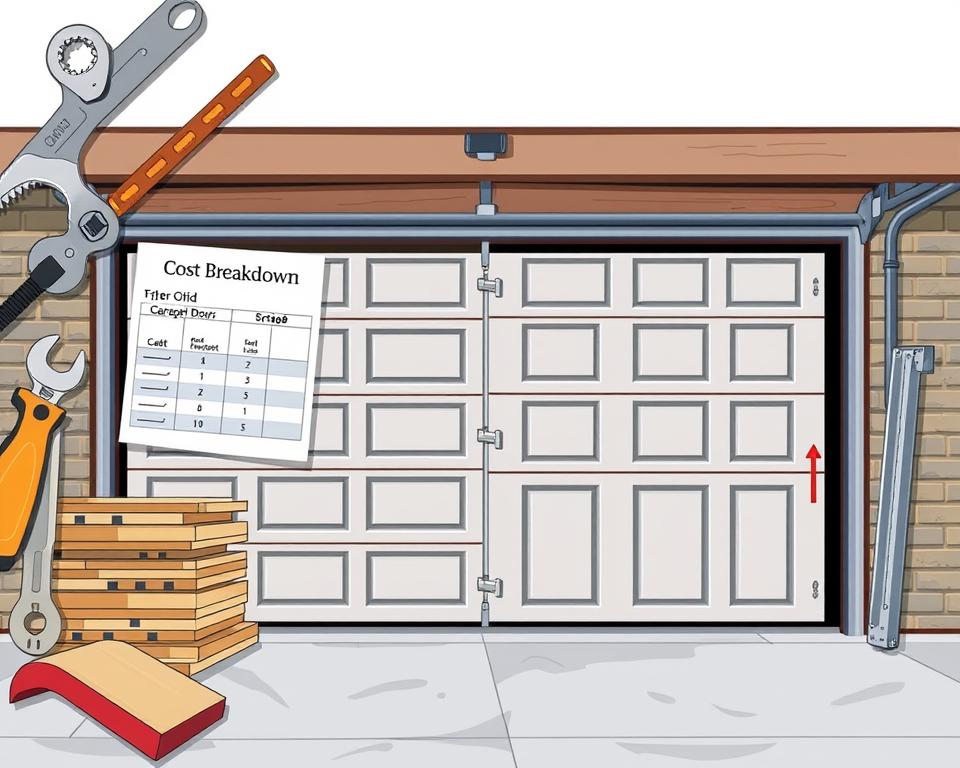
To figure out the best time to replace garage door, think about these points:
- Average cost of labor for garage door replacement: $350
- Average additional cost for insulation: $1,037
- Annual energy savings from modern insulated garage doors: 15% to 20%
We suggest replacing a garage door if repair costs are more than 50% of the new door’s price. By weighing these costs and benefits, you can decide when it’s the right time to replace your garage door.
Modern Features Worth Considering for Your Next Garage Door
When thinking about replacing your garage door, modern features are key. They boost your home’s security, make it more functional, and save energy. It’s important to know when to replace a garage door and the perks of getting a new one.
Look for rolling code technology for better security, smartphone-controlled openers for ease, and automatic lighting for safety. Modern doors also have advanced locks, weatherproofing, and energy-saving materials. These features can cut down on energy costs and maintenance.
Here are some benefits of modern garage doors:
- Improved security with rolling code technology and advanced locking systems
- Enhanced convenience with smartphone-controlled openers and automatic lighting
- Increased energy efficiency with insulated doors and energy-saving materials
- Reduced maintenance needs with durable materials and weatherproofing technologies
Thinking about when to replace your garage door is vital. It keeps your home safe, working well, and energy-smart. A modern garage door with the latest features means better security, ease, and energy savings. It also boosts your home’s value and looks.
Making the Smart Choice for Your Home’s Safety and Value
When we think about replacing our garage doors, we’re thinking about our home’s safety and value. Old or broken garage doors can be dangerous. But, a new one can make our home safer and look better. Most garage doors last 15-20 years before they start to have problems.
Getting a new garage door can be a smart move. It can make your home worth more when you sell it. Plus, it can save you money on energy bills. And, it adds extra security with smart openers and new technology.
Choosing the right garage door is a smart investment. It keeps your home safe and looks good for a long time. By knowing the latest trends and costs, we can make our homes better for years.

